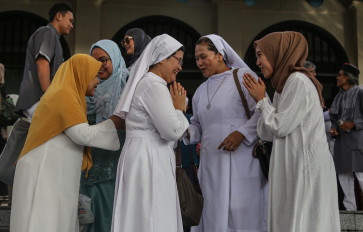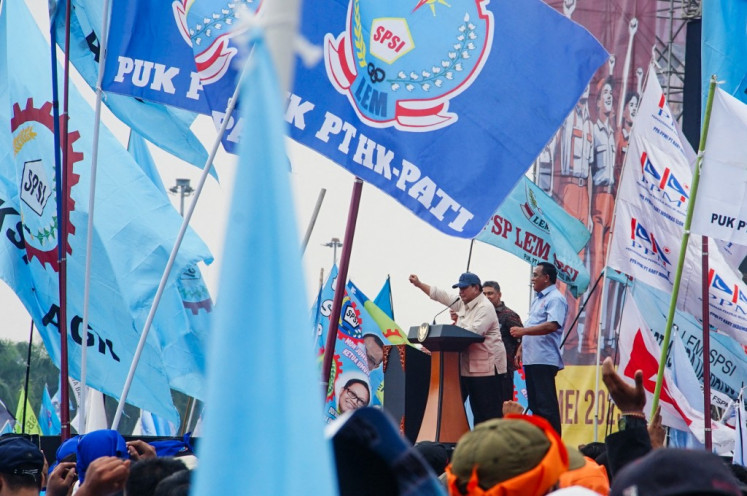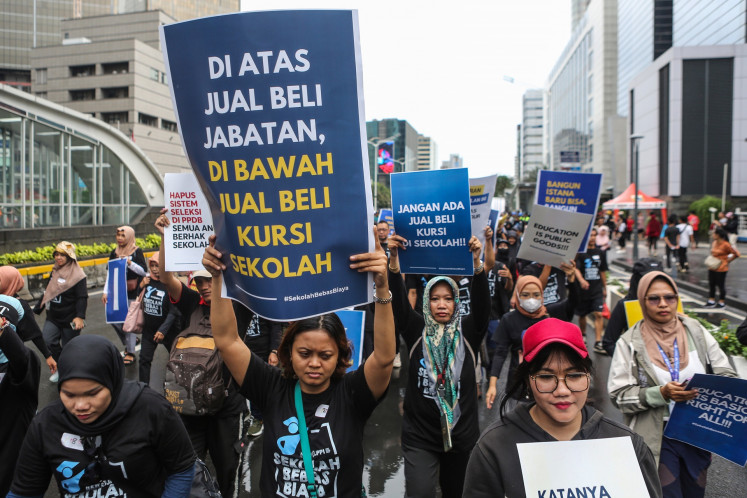RI as a new middle power?
It is quite interesting to read in Santo's article on Indonesia "A new *middle' power" (The Jakarta Post, Oct
Change text size
Gift Premium Articles
to Anyone

I
t is quite interesting to read in Santo's article on Indonesia "A new *middle' power" (The Jakarta Post, Oct. 31, 2009) that Indonesia has been acknowledged as a new middle power in these bewildering global politics.
However, this acknowledgement has been perceived as a challenge for Indonesia; whether it can rise as a new middle power or become, on the contrary, a new semi-failed state.
In this context, it is crucial to understand what we mean by middle power. It is important because the label of middle power is pertinent to the ability of a nation-state to make projections of its diplomatic and security activities in both the domestic and international environment.
We should bear in mind that there is no clear agreed definition of a middle power and middle-power diplomacy.
The term has been used variously to describe geographic, material, normative and behavioral attributes among a diverse group of middle-ranking states on the global stage.
Such ranking exercises based on selective criteria, however, are fraught with difficulty because, as other scholars have shown, there is little or no correlation between a country's size or position in the international system and the conduct of its diplomacy.
In short, being a middle-sized country does not necessarily determine foreign policy behavior. But having middle-ranking economic, military and diplomatic capabilities and actively pursuing a middle-power approach to international affairs does offer some insight into what certain states can do to their international environment.
Clearly, when foreign policy practitioners make declaratory statements about exercising a country's "middle power" role in the international system, they are employing a type of shorthand for a pre-defined and generally agreed set of foreign policy behaviors.
That set of behaviors includes a preference for working through multilateral institutions and processes, a commitment to promoting international legal norms and a pro-active use of diplomatic, military and economic measures to achieve selected economic and political outcomes.
Despite obvious definitional difficulties with the concept, middle-power diplomacy continues to resonate with politicians, practitioners and scholars alike as a simple way of characterizing the foreign policy activities of certain countries which are neither great powers nor small.
As the Canadian scholar Dennis Stairs has argued, "The impression that there really are certain powers of secondary rank with similar capabilities and similar minds, and with a similar approach to the maintenance of the international system, seems somehow to survive the *real-world' observation that things are in fact a jumble".
Ultimately, engaging in middle-power diplomacy is no less self-interested than the behavior of any other state in the international system. That self-interest, however, is filtered through the practical consideration of when and where middle-ranking states can achieve successful diplomatic outcomes in pursuit of their national interests.
Therefore, it is also very important to set our national interests clearly as the basis of our foreign policy and diplomatic activities. Without having explicit, manageable and realistic national interests will only put us as a nation-state without a clear road map in the global arena.
To put it another way, the so-called "middle powers", then, must look for specific, niche opportunities to exercise their power and influence. If great powers are defined by having global interests and reach, then the middle power category defines a group of states with a more limited regional set of core national interests and force projection capabilities.
The questions are now: are we willing to do that? And if yes, what kind of foreign policy mechanism can we utilize in defining and promoting our regional interests and force projection capabilities?
The writer is professor of international relations, Parahyangan Catholic University, Bandung.
Plagiarism
Thu, 02/04/2010 1:11 PM * Opinion
The article "RI as a new middle power?" by Prof. Anak Agung Banyu Perwita, published on this page on Nov. 12, 2009, is very similar to a piece written by Carl Ungerer titled "The *Middle Power' Concept in Australian Foreign Policy", which was published in the Australian Journal of Politics and History: Volume 53, Number 4, 2007, pp.538-551.
Both in terms of ideas and in the phrases used, it is very evident this is not the original work of the writer.
The Jakarta Post takes claims of plagiarism and the infringement of ideas very seriously.
We hereby withdraw the offending article by Anak Agung Banyu Perwita and apologize to our readers, most especially to Mr. Carl Ungerer, for this editorial oversight.
- The Editor









